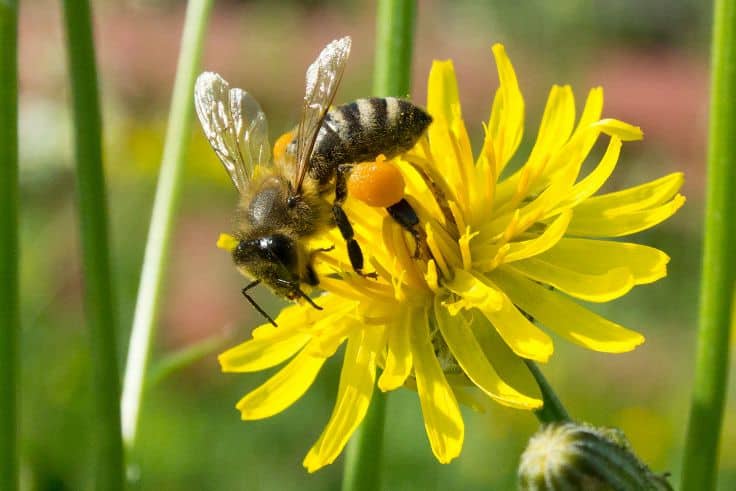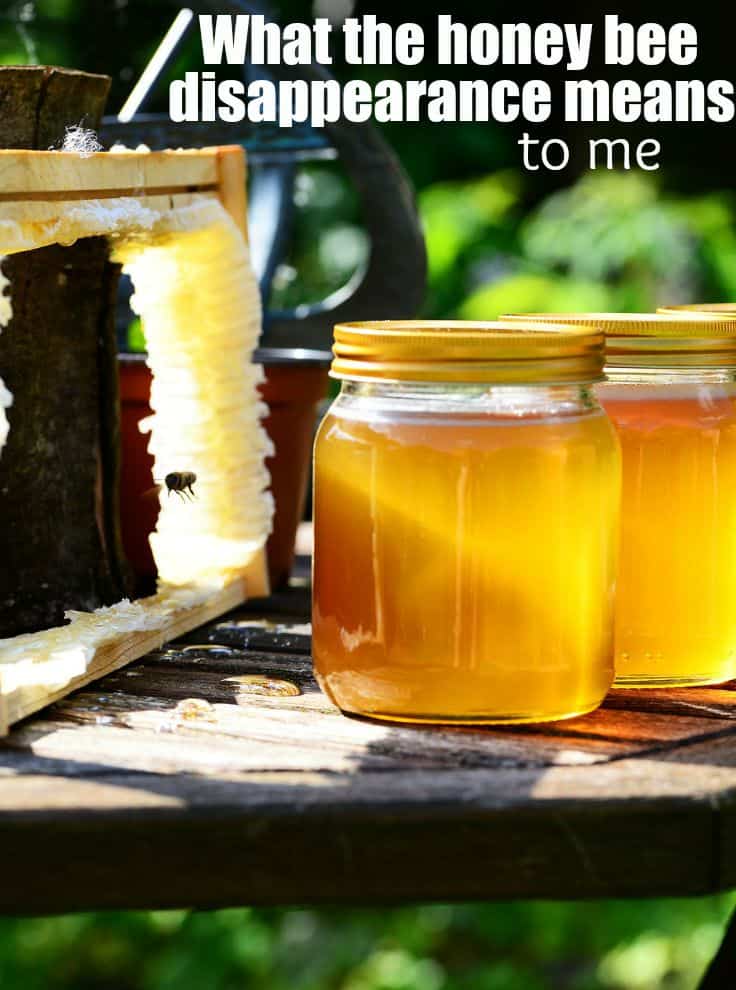Last Updated on September 5, 2020 by Ellen Christian
I still remember when I first heard about colony collapse disorder and that the honey bees were disappearing. There were so many theories about why this was happening. Could it be pollution? Could it be global warming? Could it be cell phones? People stopped for a few moments during their busy day and actually thought about how our future would be impacted by the disappearance of the honey bees. Find out more about the honey bee disappearance and what it means.
Posts may be sponsored. This post contains affiliate links, which means I will make a commission at no extra cost to you should you click through and make a purchase. As an Amazon Associate I earn from qualifying purchases.
The Honey Bee Disappearance and What it Means
When I was a little girl, we went to New Hampshire every summer to visit my Great Uncle for a family reunion. He lived way out in the middle of nowhere and had huge gardens, bee hives and lived quite self sufficiently. You could say he was part of what inspired me to try to do the same when I got older. I remember watching those fenced off bee hives with wonder – not quite understanding how these little creatures made the honey we all loved to eat.
As I got older, I began to understand that honey bees do a lot more than give us honey. They pollinate many of our plants and play a vital role in our food supply. In case you skipped Honey Bees 101, as honey bees fly from flower to flower some of the pollen from each flower ends up on their bodies which in turn gets deposited on other flowers. That pollinates those flowers and they bloom. That bloom produces the gorgeous flowers, juicy berries and delicious tomatoes we all enjoy. No pollination means no fruit, berries and veggies. That means a whole bunch of very hungry people.
Well if you’ve been watching the news lately, you may have heard about a new parasite that turns honey bees into zombies. Normally, I’m a huge fan of zombies but not this time. As zombies, the honey bees walk in circles until they die. That means no flying, no making honey, no pollination. Scientists think that this parasite is a relative of the one that is currently impacting the honey bee population. They hope that by learning more about this parasite, they can figure out what’s causing colony collapse disorder and hopefully stop this problem before it continues to spread.
I hope that the scientists really do find out what’s causing the problems with the honey bees. I haven’t heard much about colony collapse disorder lately in the media. Maybe the interest in the zombie parasite will get people talking about the disappearance of the honey bees again so we can stop it before it’s too late. What do you think?

Ellen is a busy mom of a 24-year-old son and 29-year-old daughter. She owns six blogs and is addicted to social media. She believes that it doesn’t have to be difficult to lead a healthy life. She shares simple healthy living tips to show busy women how to lead fulfilling lives. If you’d like to work together, email info@confessionsofanover-workedmom.com to chat.



Thought you might be interested in connecting with some of the latest research on Bee Health, both at http://www.extension.org/bee_health and https://www.facebook.com/pages/Bee-Health-eXtensionorg/218620291454?sk=wall.
As an overworked mom (love your blog title) it's hard to keep up and discern what is the latest science or science fiction. These resources do their best to bring the public the latest bee health research from nation's Land Grant Universities.
Let these bee keepers come out to where I live. They can have all the bees that they want. We are tired of them. We cannot have a swimming pool, we have hundreds in there by the end of the day. If there is running water outside, they flock to it. When we hang our clothes out to dry, we have to be careful of the bees that are landing on the clothes.
I just hope that they keep trying to find out what's going on. I have no idea what the real cause is but I'm positive that if we don't deal with it now, it will have horrible results in the future!
Arkansas is covered in clover and I remember for years, how many honey bees were all over the clover. As I was gardening, I noticed there were no honey bees and I got to reading up on it and the theory was the wild bees were being hit by parasites. Many of the beekeepers were already using strips in their hives to prevent it. I also think there has been a decline here in ladybugs and praying mantis. My theory is it can't be helping that we are spraying heavily for mosquitos and the only bees that are being saved when farmers are crop dusting is the beekeepers bees because, by law, they have to be informed before the crop dusters can spray, but they only usually have 24 hours to get their bees in.
Very interesting. I hadn't heard of this before. Our pastor imported bees from Russia to start his colony. I wonder how different species of bees are impacted by this parasite.
Thanks for sharing this information.
my dad has a small apiary. so far, this parasite has not invaded his bees. love his raw honey.
I buy my honey from a local beekeeper and she says one of the reason she thinks the bees are getting this parasite and dieing is because they are exhausted. She said many bees are transported around to all the crops to pollinate them. Her bees just stay in one place in orchards, etc. She has not YET experienced this problem. Of course, that's her opinion but it made a lot of sense to me.